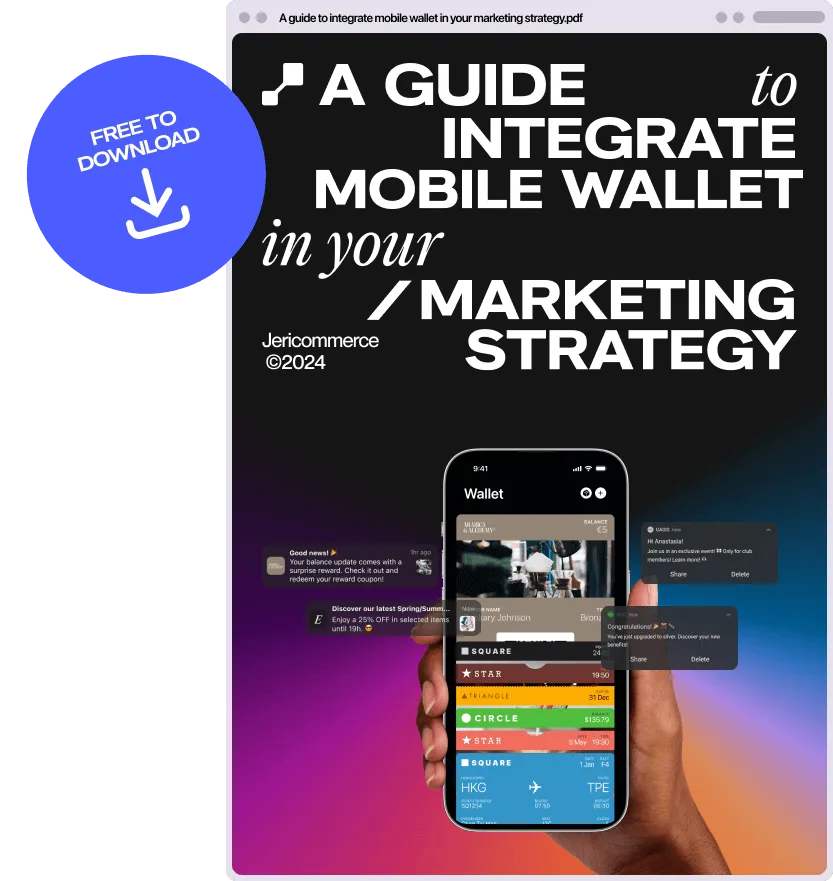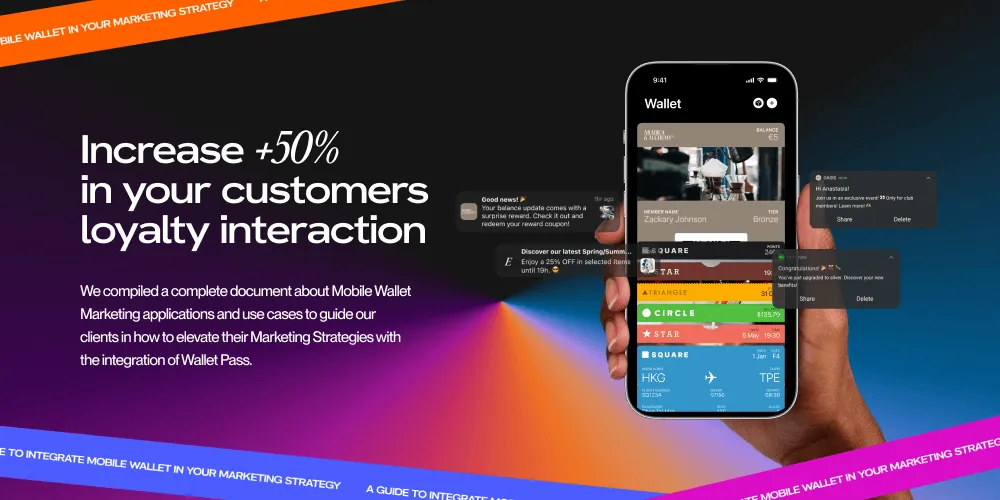Leveraging Geolocation Marketing: Success Stories and Innovative Tools to Inspire Your Next Campaign
Marta Pérez
May 24, 2024
.jpeg)
In today's digital landscape, location-based marketing has emerged as a powerful tool for businesses looking to engage customers more effectively. By targeting consumers based on their physical locations, companies can deliver personalized experiences that drive engagement and boost sales. Incorporating elements like loyalty cards, geomarketing, and push notifications can further enhance these strategies. Here are some inspiring examples of successful location-based marketing campaigns that highlight the potential of this strategy, along with a look at the innovative tools and technologies that can help your business achieve similar success.

Successful Location-based Marketing Campaigns
Starbucks: Personalized Promotions
Starbucks has long been a pioneer in using technology to enhance customer experience. One of their most successful location-based marketing campaigns involved sending personalized promotions to customers through their mobile app. When a customer was near a Starbucks location, they would receive a push notification with special offers or rewards, encouraging them to visit the store. Additionally, Starbucks utilizes loyalty cards integrated into their app, allowing customers to earn and redeem rewards seamlessly. This approach not only increased foot traffic but also fostered customer loyalty by providing timely and relevant incentives. For more on successful campaigns, see our location-based marketing campaigns article.
Uber: Real-Time Geotargeted Ads
Uber utilized geomarketing to reach potential riders with real-time, location-based ads. During events or peak times, Uber would send push notifications to users in specific areas, offering discounts or highlighting the availability of rides. For instance, during major concerts or sports events, Uber would target attendees with promotions to entice them to use the service. Additionally, Uber’s loyalty program rewards frequent riders, encouraging repeat usage. This strategy helped Uber tap into high-demand situations and attract new users.
Dunkin' Donuts: Localized Social Media Campaigns
Dunkin' Donuts launched a location-based marketing campaign focused on social media platforms like Facebook and Instagram. They used geotargeted ads to promote new store openings, special deals, and limited-time offers to users in specific regions. By integrating loyalty cards into their mobile app, customers could earn rewards for local purchases, enhancing engagement. By tailoring their messages to local audiences, Dunkin' Donuts was able to create a sense of community and urgency, driving both online engagement and in-store visits.
Coca-Cola: Geofencing for Event Marketing
Coca-Cola successfully used geomarketing technology as part of their location-based marketing efforts to enhance their event marketing campaigns. During major events such as music festivals and sports games, Coca-Cola set up virtual perimeters around event venues. Attendees who entered these zones received push notifications with exclusive content, offers, and interactive experiences related to Coca-Cola. Additionally, Coca-Cola introduced digital loyalty cards that allowed attendees to collect rewards during events. This not only increased brand visibility but also engaged consumers in a fun and memorable way.
Walmart: In-Store Navigation and Promotions
Walmart integrated location-based marketing technology into their mobile app to improve the in-store shopping experience. The app provided customers with real-time navigation assistance to find products within the store. Additionally, Walmart used location-based data to send personalized promotions and discounts to shoppers as they browsed different sections. By incorporating a loyalty card system, Walmart ensured that customers could easily track and redeem their rewards, enhancing the convenience of shopping while boosting sales through targeted offers.
Macy's: Beacon Technology for Personalized Shopping
Macy's implemented beacon technology in their stores to deliver personalized shopping experiences. By installing beacons throughout their locations, Macy's could send tailored messages and offers to customers' smartphones based on their proximity to specific departments. For example, a customer lingering in the shoe section might receive a discount on footwear via a push notification. Additionally, Macy's loyalty cards integrated with the beacon system allowed customers to accumulate rewards seamlessly. This strategy not only drove sales but also enhanced customer satisfaction by providing relevant and timely information.
Innovative Tools and Technologies for Effective Location-based Marketing
To harness the full potential of location-based marketing, businesses need to leverage innovative tools and technologies that facilitate precise targeting and personalized interactions. Incorporating loyalty cards, geomarketing, and push notifications can significantly enhance these efforts. Here are some of the cutting-edge solutions available today:
Geofencing Platforms
Geofencing platforms enable businesses to create virtual boundaries around specific locations. When customers enter these zones, they receive targeted notifications or ads. Tools like Radar, GroundTruth, and Factual are popular choices for implementing geofencing campaigns, offering detailed analytics and real-time engagement capabilities. Integrating these platforms with loyalty card systems can provide deeper insights into customer behavior. Learn more about latest trends in location-based marketing.

Beacon Technology
Beacons are small, wireless devices that transmit Bluetooth signals to nearby smartphones. They are ideal for indoor environments where GPS may not be effective. Platforms like Estimote, Kontakt.io, and Gimbal provide robust beacon solutions that allow businesses to send hyper-localized messages and offers to customers within close proximity. When combined with push notifications and loyalty programs, beacons can create a cohesive and engaging customer experience.

Mobile Wallet Integration
Integrating mobile wallet marketing tools, like Jericommerce, can enhance location-based marketing campaigns by allowing businesses to deliver offers, loyalty rewards, and promotions directly to customers' digital wallets. This not only increases convenience for users but also improves the redemption rate of promotions. Mobile Wallets integrate various technologies, including geofencing, beacons, and NFC, to provide a seamless and scalable approach to proximity marketing.

Jericommerce: The Mobile Wallet solution from Jericommerce
Location-Based Analytics
Tools such as Google Analytics, Adobe Analytics, and Localytics offer advanced location-based analytics that help businesses understand customer behavior in different geographic areas. These insights can inform more effective targeting and personalization strategies, especially when integrated with loyalty programs to track and reward customer interactions.
Augmented Reality (AR)
AR can enhance location-based marketing by offering interactive and immersive experiences. For instance, Pokémon GO's success demonstrated the potential of AR in driving foot traffic to specific locations. Businesses can use AR to create engaging, location-based experiences that captivate customers and encourage visits, complemented by push notifications to guide user interactions.
Conclusion
Location-based marketing offers a myriad of opportunities for businesses to connect with customers in more meaningful ways. These successful campaigns from major brands like Starbucks, Uber, Dunkin' Donuts, Coca-Cola, Walmart, and Macy's demonstrate the effectiveness of leveraging location-based data combined with loyalty cards, geomarketing, and push notifications to create personalized, engaging, and timely marketing efforts. By adopting similar strategies and utilizing innovative tools and technologies, your business can tap into the power of location-based marketing to drive growth and build stronger customer relationships.
Get started with Jericommerce today!
Increase customer loyalty interaction by +50%







